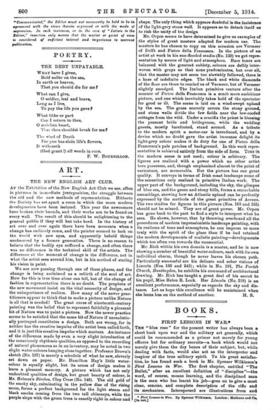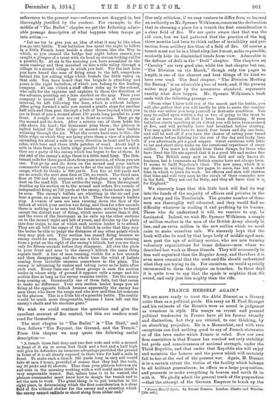BOOKS.
FIRST LESSONS IN WAR.* THE "blue rose" for the present writer has always been a short book upon war and the military art generally, which could be recommended as a primer not merely for young officers but for ordinary recruits—a book which would not merely give them the dry bones of their subject, but, while dealing with facts, would also act as the interpreter and inspirer of the true military spirit. To his great satisfac- tion, he has found such a book in Mr. Spenser Wilkinson's First Lessons in War. The first chapter, entitled " The Bullet," after an excellent definition of " discipline "—the word, of course, means learning, and the disciplined man is the man who has learnt his job—goes on to give a most clear, concise, and complete description of the rifle and its mechanism. Interspersed are illustrations from and
• First Lessons in War. By Spenser Wilkinson. London : Methuen and Co. net.)
references to the present war—references not dragged in, but thoroughly justified by the context. For example, in the middle of " The Bullet" chapter we get the following admir- able passage descriptive of what happens when troops go into action :-
"Let me try to give you an idea of what it may be like when you go into battle. Your battalion has spent the night in billets in a little French town beside a clear stream like the Wey in which, as you crossed the bridge last night before sunset, you caught a glimpse of a trout with its head up stream looking out for a possible fly. At six in the morning yon have assembled in the main roadway and then marched on into a side valley through a village to a second village in which you halt. For the last hour you have heard the roar of firing away to the left, somewhere behind the low rolling ridge which bounds the little valley on that side. You have heard that the brigade is attacking and yours is the right battalion, of which you belong to the leading company. At one o'clock a staff officer rides up to the colonel, who calls for the captains and explains to them the direction of the advance, pointing out a lane marked on the map. Then your company is moved off. Your platoon extends at three paces interval, its left following the lane, which is without hedges. After going forward a mile you ascend a gentle slope for another half mile and then pass through a belt of trees beyond which you see in front of you a mound about 150 yards long parallel to your front. A couple of men are out in front as scouts. They go up the mound and lie down. After a minute one of them holds his rifle above his head ; the lieutenant joins them ; the platoon is halted behind the little ridge or mound and you hear bullets whizzing through the air. What the scouts have seen is this : the little ridge on which they are lying gives them a view of a plateau extending for about a mile in every direction in front and to both sides, with here and there little patches of wood. About half a mile in their front is a little ridge parallel to their own on which they see a party of the enemy which has begun to fire at them. At one end of the enemy's ridge there is a little sand heap. The lieu- tenant calls for three good shots from your section, of whom you are one. You go up and lia down on the mound and your section commander tells you that you are to fire at the sand hill to get the range, which he thinks is 800 yards. You fire at 800 yards and see no result, the next man fires at 750, no result. The third man fires at 700 and the sergeant with a field-glass sees a splash of dust on the sand hill. That settles the range. Then the sergeant doubles up his section on to the mound and orders five rounds of independent firing at.700 yards at the enemy, whose heads can just be seen. The enemy's bullets are whistling in the air and you hear a groan, as a man near you is hit. Then the enemy's bullets stop. A swarm of men are seen running down the face of the hillock at which your section was firing, and then for a few seconds there is nothing to be seen but the landscape, nothing to be heard except the distant roar of firing, which seems nearer than it did, and the voice of the lieutenant as he calls up the other sections on to the mound right-and left of yours, and divides up the plain into four strips, to one of which each section leader is to attend. They are all told the range of the hillock in order that they may
the better be able to judge the distances of any other points which they may pick out. Your section has ceased firing because no enemy could be seen. Then you see a thin line of men running from a point on the right of the enemy's hillock, but you see them only for fifteen seconds before they disappear. All over the plain in your front and near to the enemy's hillock the same thing repeats itself. A. line of men running, visible for a few seconds and then disappearing, and the whole time the whirl of bullets coming from invisible enemies somewhere in the plain. The enemy is advancing by rushes and taking cover as he halts after each rush. Every time one of these groups is seen the section leader in whose strip of ground it appears calls a range and his section fires as long as the enemy remains visible. Yet the enemy keep coming on. Occasionally one of them falls, but that seems to make no difference. Your own section leader keeps you all
firing at the opposite hillock because apparently the enemy has men there who know the range and who now and then hit someone in the platoon. This is a little bit of a possible battle. The reality would be much more disagreeable, because I have left out the enemy's shells and his machine guns."
We wish we could continue the quotation and give the excellent account of fire control, but this our readers must read for themselves.
The next chapter to " The Bullet" is " The Shell," and then follows " The Bayonet., the Ground, and the Trench." From this chapter we may quote the following useful description:—
" A trench three feet deep and two feet wide and with a mound in front of it six or seven feet thick and a foot and a half high will give its defenders an immense advantage provided the ground in front of it is all clearly exposed to their view for half a mile in front. To make such a trench 100 yards long in easy soil would take 40 men 3 hours, provided of course that they had the tools, say 30 picks and 35 shovels. Thus then your platoon between six and nine in the morning workinc, with a will could make itself a very respectable trench. But, unless time is to be wasted, the platoon commander must know how to design the trench and to set the men to work. The great thing is to put trenches in the right place, in determining which the first consideration is a clear field of fire without shelter for the enemy and a situation which the enemy cannot enfilade or shoot along from either end." Our Only criticism, if we may venture to differ from co learned an authority as Mr. Spenser Wilkinson, concerns the declaration that in choosing a place for a trench the first consideration is a clear .field of fire. We are quite aware that that was the old view, but we had gathered that the practice of the last three months Lad been to think rather of invisibility and pro:- tection from artillery fire than of a field of fire.. Of course tp trench must not be in a blind alley, but it must, as far impossible,
modestly bide its diminished heads from view.. Admirable is the defence of drill in the "Drill" chapter. The chapters on " Cavalry" are very good also, while the last chapter but one, "The Division on the March," though only ten pages in length, is one of the clearest and best things of its kind we have ever read. The final chapter, " The Division Meeting the Enemy," is an admirable piece of work, and, if the present writer may judge by the manoeuvre standard, represents exactly what does happen. Mr. Spenser Wilkinson's book ends with the following passage :—
"From what I have told you of the march and the battle, you will also gather that you will hardly be able to eerie the country in this war unless you keep yourself in first-rate condition. You may be called upon within a day or two of going to the front to do all or more than all that I have been describing. If yens battalion starts marching at six o'clock you will have been arouse4 at five, and will probably have had breakfast before starting. You may quite well have to march four hours and dig one hour, and will be well off if you have the chance of eating your bread and cheese before fighting for the rest of the day and lucky then if you afterwards get a good supper. Great exertions with little to eat and short sleep make up the occasional experience of every soldier. You must not shrink from these things, for those whd have lived the life are agreed that it is a good life and Makes fine men. The British army now in the field not only knows its business, but is temperate as British armies have not always been. It seems to fulfil Napoleon's ideal. The new army, which it is my desire in writing these few pages to serve, has but a short time in which to learn its work. Its officers and men will shorten. that time and will very soon be the rivals of their comrades now in the field. They are out for Duty, and they all know that it is for England."
We sincerely hope that this little book will find its *ay,'
into the hands of the majority of officers and privates in the new Army and the Territorials. The greater number of these men are thoroughly well educated, and they would find no difficulty whatever in reading it and profiting by its lessons.
Those who do understand it will, we venture to say, be
fascinated. Indeed, we wish Mr. Spenser Wilkinson a couple of million readers in the men of the British Army already iii line, and an extra million in the new million which we -must
raise to make ourselves safe. We sincerely hope that the book will also be read by that large body of middle-aged men; men past the age of military service, who are now forming voluntary organizations for home defence—men' whom we described last week as Home Guards. They will necessarily be less well organized than the Regular Army, and therefore it is even more essential that the rank-and-file should understand
what they are trying to do. For ourselves, we would specially, recommend to them the chapter on trenches. In these days
it is quite true to say that the spade is mightier than the sword, and only just less mighty than the rifle.



























































 Previous page
Previous page